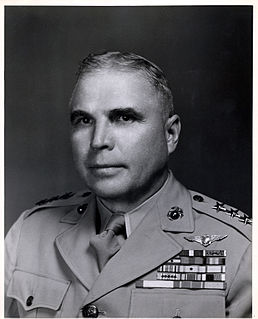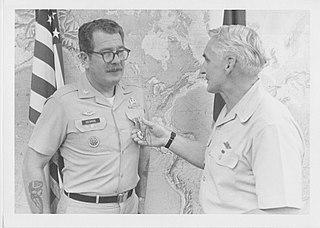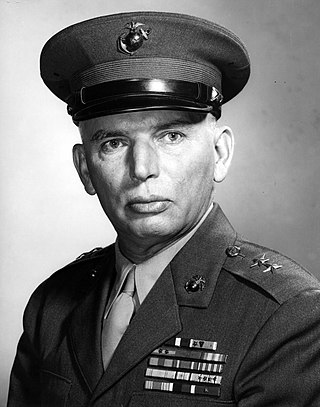
The Distinguished Service Medal (DSM) is a military decoration of the United States Army that is presented to soldiers who have distinguished themselves by exceptionally meritorious service to the government in a duty of great responsibility. The performance must be such as to merit recognition for service that is clearly exceptional. The exceptional performance of normal duty will not alone justify an award of this decoration.

The Legion of Merit (LOM) is a military award of the United States Armed Forces that is given for exceptionally meritorious conduct in the performance of outstanding services and achievements. The decoration is issued to members of the eight uniformed services of the United States as well as to military and political figures of foreign governments.

Julius Ochs Adler was an American publisher, journalist, and highly decorated United States Army officer with the rank of major general. He distinguished himself during World War I as Major and battalion commander in the 306th Infantry Regiment and received Distinguished Service Cross, the second highest decorations of the United States military for valor in combat.

Lemuel Cornick Shepherd Jr. was a four-star general of the United States Marine Corps. A veteran of World War I, World War II, and the Korean War, he was the 20th Commandant of the Marine Corps. As Commandant, he secured a place on the Joint Chiefs of Staff, gaining parity for the Marine Corps with the other military services.

Bruce Palmer Jr. was a general in the United States Army. He commanded the XVIII Airborne Corps during Operation Power Pack, the II Field Force, Vietnam during the Vietnam War, and was acting Chief of Staff of the United States Army from July to October 1972.
The United States military inter-service awards and decorations are those medals and ribbons which may be awarded to all members of the six military branches of the U.S. Armed Forces. Each military department awards inter-service awards under the same criteria.
Authorized foreign decorations of the United States military are those military decorations which have been approved for wear by members of the United States armed forces but whose awarding authority is the government of a country other than the United States.

Randolph McCall Pate was a United States Marine Corps general who served as the 21st Commandant of the Marine Corps from 1956 to 1959.

Lieutenant General Louis Earnest Woods, one of the Marine Corps' outstanding aviators, served as commanding general, aircraft, Fleet Marine Force, Atlantic, and 2nd Marine Aircraft Wing at the Marine Corps Air Station Cherry Point, North Carolina, prior to his retirement. During World War II, he commanded the Cactus Air Force at Guadalcanal during November and December, 1942, and later, at Okinawa, was commanding general, Tactical Air Force, Tenth Army, and the 2nd Marine Aircraft Wing.

Lieutenant General Hanford MacNider was a senior officer of the United States Army who fought in both world wars. He also served as a diplomat, the Assistant Secretary of War of the United States from 1925 to 1928 and the National Commander of The American Legion from 1921 to 1922. He was also the United States Ambassador to Canada.

Keith Barr McCutcheon was a highly decorated Marine Corps four-star general and aviator seeing combat in World War II, the Korean War, and the Vietnam War. He earned the Distinguished Flying Cross and ten Air Medals.
John Emmett Pitts Jr. was a brigadier general in the United States Air Force and was director of the International Staff of the Inter-American Defense Board.

Michael Shannon Davison was a United States Army four-star general who served as Commander in Chief, United States Army Europe/Commander, Central Army Group from 1971 to 1975.

Major General Archibald Vincent Arnold was a United States Army officer who served during World War II.
John Martin Higgins was a rear admiral in the United States Navy.

René Edward De Russy Hoyle was a major general in the United States Army.

The Legion of Merit is a decoration of the United States and is awarded to foreign military personnel in four grades and to U.S. military personnel without distinction of degree. The following are notable recipients within the award.

Walter William Wensinger was a highly decorated officer of the United States Marine Corps with the rank of lieutenant general. He is most noted for his service as commanding officer of 23rd Marine Regiment during Battle of Iwo Jima, when he received the Navy Cross, the United States military's second-highest decoration awarded for valor in combat. Wensinger finished his career as special advisory assistant to the commandant of the Marine Corps.
![<span class="mw-page-title-main">Frederick Charles Lough</span> U.S. Army [[Brigadier general (United States)|Brigadier General]]](https://upload.wikimedia.org/wikipedia/commons/thumb/2/2e/Frederick_C._Lough.jpg/206px-Frederick_C._Lough.jpg)
Frederick Charles Lough (1916–2002) was a U.S. Army Brigadier General. He was a Lieutenant Colonel during World War II and received a Legion of Merit award for exceptionally meritorious conduct. He was also a recipient of the Distinguished Service Medal.

Oliver Lyman Spaulding Jr. was a career officer in the United States Army. A veteran of the China Relief Expedition, Philippine–American War, Pancho Villa Expedition, World War I, and World War II, he attained the rank of brigadier general, and was a recipient of the Army Distinguished Service Medal and Legion of Merit from the United States, and the Order of the Black Star (Commander) from France.














![<span class="mw-page-title-main">Frederick Charles Lough</span> U.S. Army [[Brigadier general (United States)|Brigadier General]]](https://upload.wikimedia.org/wikipedia/commons/thumb/2/2e/Frederick_C._Lough.jpg/206px-Frederick_C._Lough.jpg)
